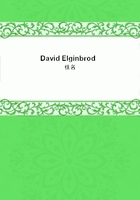
第14章
Mony thanks, mem, for what ye hev' done in that way afore; an' good mornin' to ye, mem. I'm sorry we should hae ony misunderstandin', but I canna help it for my pairt."With these words David withdrew, rather anxious about the consequences to Hugh of this unpleasant interference on the part of Mrs. Glasford. That lady's wrath kept warm without much nursing, till the laird came home; when she turned the whole of her battery upon him, and kept up a steady fire until he yielded, and promised to turn his upon David. But he had more common-sense than his wife in some things, and saw at once how ridiculous it would be to treat the affair as of importance. So, the next time he saw David, he addressed him half jocularly:
"Weel, Dawvid, you an' the mistress hae been haein' a bit o' a dispute thegither, eh?""Weel, sir, we warna a'thegither o' ae min'," said David, with a smile.
"Weel, weel, we maun humour her, ye ken, or it may be the waur for us a', ye ken." And the laird nodded with humorous significance.
"I'm sure I sud be glaid, sir; but this is no sma' maitter to me an' my Maggie, for we're jist gettin' food for the verra sowl, sir, frae him an' his beuks.""Cudna ye be content wi the beuks wi'out the man, Dawvid?""We sud mak' but sma' progress, sir, that get."The laird began to be a little nettled himself at David's stiffness about such a small matter, and held his peace. David resumed:
"Besides, sir, that's a maitter for the young man to sattle, an' no for me. It wad ill become me, efter a' he's dune for us, to steek the door in's face. Na, na; as lang's I hae a door to haud open, it's no to be steekit to him.""Efter a', the door's mine, Dawvid," said the laird.
"As lang's I'm in your hoose an' in your service, sir, the door's mine," retorted David, quietly.
The laird turned and rode away without another word. What passed between him and his wife never transpired. Nothing more was said to Hugh as long as he remained at Turriepuffit. But Margaret was never sent for to the House after this, upon any occasion whatever. The laird gave her a nod as often as he saw her; but the lady, if they chanced to meet, took no notice of her. Margaret, on her part, stood or passed with her eyes on the ground, and no further change of countenance than a slight flush of discomfort.
The lessons went on as usual, and happy hours they were for all those concerned. Often, in after years, and in far different circumstances, the thoughts of Hugh reverted, with a painful yearning, to the dim-lighted cottage, with its clay floor and its deal table; to the earnest pair seated with him at the labours that unfold the motions of the stars; and even to the homely, thickset, but active form of Janet, and that peculiar smile of hers with which, after an apparently snappish speech, spoken with her back to the person addressed, she would turn round her honest face half-apologetically, and shine full upon some one or other of the three, whom she honoured with her whole heart and soul, and who, she feared, might be offended at what she called her "hame-ower fashion of speaking." Indeed it was wonderful what a share the motherhood of this woman, incapable as she was of entering into the intellectual occupations of the others, had in producing that sense of home-blessedness, which inwrapt Hugh also in the folds of its hospitality, and drew him towards its heart. Certain it is that not one of the three would have worked so well without the sense of the presence of Janet, here and there about the room, or in the immediate neighbourhood of it--love watching over labour. Once a week, always on Saturday nights, Hugh stayed to supper with them: and on these occasions, Janet contrived to have something better than ordinary in honour of their guest. Still it was of the homeliest country fare, such as Hugh could partake of without the least fear that his presence occasioned any inconvenience to his entertainers. Nor was Hugh the only giver of spiritual food.
Putting aside the rich gifts of human affection and sympathy, which grew more and more pleasant--I can hardly use a stronger word yet--to Hugh every day, many things were spoken by the simple wisdom of David, which would have enlightened Hugh far more than they did, had he been sufficiently advanced to receive them. But their very simplicity was often far beyond the grasp of his thoughts; for the higher we rise, the simpler we become; and David was one of those of whom is the kingdom of Heaven. There is a childhood into which we have to grow, just as there is a childhood which we must leave behind; a childlikeness which is the highest gain of humanity, and a childishness from which but few of those who are counted the wisest among men, have freed themselves in their imagined progress towards the reality of things.